The Deputy Finance Minister, Charles Adu Boahen, has said a big chunk of depositors locked-up funds during the banking sector clean-up have been settled. He said at least 96% of persons whose monies were locked-up in the collapsed banks and saving and loans companies have received their deposits. Mr. Charles Adu Boahen disclosed that 20% of the funds were paid in cash while 80% was paid through bond issues. “The bonds were structured to pay out over four years,” Mr. Adu Boahen said on the floor of parliament during the debate on the Mid-year Budget Review in Parliament on Tuesday, July 28, 2020. His revelations follow a promise by former President John Mahama to pay depositors locked-up monies within a year if elected to once again assume the helm of the country’s affairs in the December 2020 presidential polls. Speaking at an event in the UPSA auditorium to outdoor his running mate, Prof Jane Naana Opoku-Agyemang, Mr. Mahama said the next National Democratic Congress (NDC) government will not put up any long-term payment plans that will further worsen the living conditions of the victims of the collapsed institutions. However, according to Mr. Boahen, the claim that funds are still locked-up are untrue, stressing that less than 4% of these monies remain unpaid. The Deputy Finance Minister said the Nana Akufo-Addo government has set aside GH¢3.1 billion for such payments. He said the rest of the payments will be done when the court grants the receiver the right to liquidate the assets of the defunct financial institutions. As part of Ghana’s financial sector clean up, the central bank revoked the licenses of 347 Microfinance Companies and 23 Savings and Loans and Finance House Companies in 2019, citing insolvency, mismanagement and fraud in some cases. The Bank of Ghana also revoked the licenses of some banks between 2017 and 2019.
IN THE MATTER OF THE BANKS AND SPECIALISED DEPOSIT-TAKING INSTITUTIONS ACT, 2016 (ACT 930) IN THE MATTER OF THE RECEIVERSHIPS OF THE 347 MICROFINANCE COMPANIES AND THE 23 SAVINGS & LOANS COMPANIES AND FINANCE HOUSE COMPANIES NOTICE TO THE GENERAL PUBLIC EXTENSION OF DEADLINE FOR SUBMISSION OF BIDS TO PURCHASE LANDED PROPERTIES, USED MOTOR VEHICLES AND CHATTELS OF THE RESOLVED COMPANIES As you may be aware, pursuant to Section 123 (1) of the Banks and Specialised Deposit-Taking Institutions Act, 2016 (Act 930), Bank of Ghana (“BoG”) on 31 May 2019 and 16 August 2019 revoked the operating licenses of 347 insolvent Microfinance Companies and 23 Savings and Loans Companies and Finance House Companies respectively. BoG in accordance with Section 123(2) of the Banks and Specialised Deposit-Taking Institutions Act, 2016 (Act 930) appointed Eric Nana Nipah, a Director of PricewaterhouseCoopers Ghana Limited (“PwC”), as the Receiver for the purposes of winding down the affairs of these institutions. A key component of the Receiver’s mandate is to secure all assets of the resolved companies and maximise their realisations for the benefit of creditors. Accordingly, in my Press Statement of 9 July 2020, I informed the general public of my intention to commence the second round of the sale of the assets of the resolved companies and requested prospective buyers to submit bids for evaluation on or before 27 July 2020. In response to the numerous requests for an extension of the deadline to enable prospective bidders appropriately respond to bidding requirements, I wish to inform the general public that I have extended the deadline for the submission of bids to purchase the assets of the resolved companies by a further two weeks from the initial deadline of 27 July 2020 to close of business on Friday, 14 August 2020. All prospective buyers who wish to acquire any of the assets (i.e. landed properties, motor vehicles and chattels) of the resolved companies should submit their bids on or before close of business on Friday, 14 August 2020. Due to the current Corona Virus (Covid-19) Pandemic, all interested bidders are required to visit the Receiver’s website to view pictures and other details of these assets on offer for sale using the following link www.ghreceiverships.com. Please note that the pictures are grouped according to the current location of the assets, i.e. Kumasi, Takoradi and Accra. Prospective buyers should submit their bids in a signed and dated formal letter, scanned and attached in an email addressed to any of the following email addresses, clearly indicating the item(s) of asset(s) they are interested in and the bid amount for each asset: vehicletender.receivership@gmail.com or assettender.receivership@gmail.com. Please note that all bids which fall short of the above requirement will be rejected. All bids are to be submitted on or before close of business on Friday, 14 August 2020. Conditions and Payment Modalities: Highest bidder shall be the preferred bidder Winners will be notified and will have 48 hours to make payment or lose the opportunity. “As is where is” For further information please contact the Receiver’s duly authorised representatives: Nicholas Anum on 0243390044 and Wilfred Tackie on 0249889540. SGD ERIC NANA NIPAH
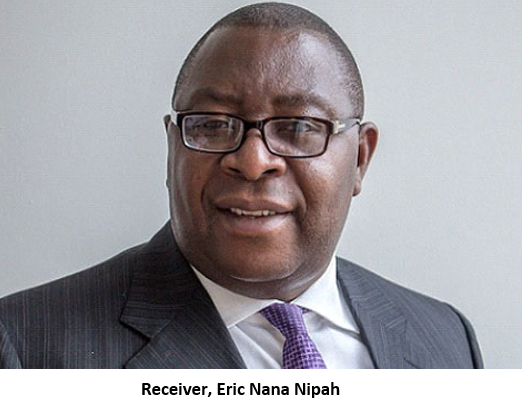
The Receiver of the defunct 347 microfinance companies, 23 savings and loans and 39 micro-credit companies has recovered GH¢598 million out of the targeted combined assets of GH¢2.9 billion. The amount was recouped from loan recoveries (GH¢44 million), placements and investments (GH¢495 million), balances transferred from other banks (GH¢50 million), sale of vehicles (GH¢4 million) and cash in vault (GH¢5 million). THE RECEIVER Addressing the media at a press briefing in Accra last Friday, the Receiver, Mr. Eric Nana Nipah, said his office had made low recoveries due to the poor quality of assets of some of the institutions, asset diversions and misstatement of a significant number of assets of some of those companies. “Some of the institutions do not have records on their assets at all, and for some of them, we don’t even have records to validate depositor claims. Another reason is encumbered assets — the fact that some of the operators of the institutions used some of the assets as collateral and security to other institutions,” he said. REPORT TO EOCO The Receiver said he had, therefore, made a report to the Economic and Organised Crimes Office (EOCO) to help with the tracing of assets of the affected institutions. “We have involved EOCO in the tracing of assets and EOCO has done some good work in this area, where they have been able to trace some assets of these institutions. We forwarded the list of the top 10 institutions from whom we have received the highest claims from depositors to EOCO and asked it to do some investigations to trace the assets of those institutions. “The intention is to recover all these assets and pay all creditors of the affected institutions. As we speak, we have initiated processes and started the phase two of sale of motor vehicles and landed properties of the institutions,” he noted. CLAIMS RECEIVED Mr. Nipah has so far received claims from the Ghana Revenue Authority (GRA)/Social Security and National Insurance Trust (SSNIT) to the tune of GH¢18 million, with claims from employees, including outstanding salaries and compensation due them, amounting to GH¢131 million. He said his office had also received claims from 490,000 depositors, amounting to GH¢8.5 billion. “The government has given us GH¢6 billion, which is made up of GH¢2 billion cash and GH¢4 billion in bonds, so we have been paying depositors through the CBG. “As part of the scheme that was designed, there was a time frame for depositors to submit their claims and so far we have received claims of GH¢8.18 billion from depositors only. Out of this amount, GH¢1.7 billion was submitted after the deadline,” he explained. He further said the government made provision for GH¢6.44 billion, which was submitted within the deadline, and out of that amount, as part of the validation process, about GH¢390 million was knocked off against people’s loans. CLAIMS REJECTED Mr. Nipah said his office also rejected claims, amounting to GH¢380 million. “Some people thought there was free money somewhere so they wanted to take advantage. Some had liquidated their investments but still presented their certificates for claims,” he said. Another reason for rejection, he said, was that as part of the laws that governed the special deposit-taking institutions, they were not supposed to deal in the trading of foreign currencies, but most of them were doing that. “Once it’s against the law, we rejected those claims and referred the matter to EOCO. The claims in this category were around GH¢70 million,” he pointed out. UNAVAILABILITY OF RECORDS Those rejections then brought the claims to be dealt with to GH¢5.6 billion, out of which GH¢5.3 billion had been validated, with the rest yet to be done due to the unavailability of records on some of the institutions, he said. “There are 36 institutions on which we do not have records to be able to validate the claims. We cannot rely only on the claims submitted by the depositors and make payment,” he said. He said his outfit had also forwarded that issue to EOCO to investigate. “In the case where EOCO doesn’t get the records, we will request our client, which is the Bank of Ghana, to advise us on the way forward,” he noted. 330,000 DEPOSITORS Mr. Nipah said his office had so far made cash payments of GH¢2.13 billion to depositors, while the rest had been paid with bonds. “As part of the scheme, we grouped depositors into various classifications. We had financial institutions, individual depositors, companies, social organisations such as schools, churches, hospitals and welfare organisations. “With respect to individual depositors, we have paid 330,000 claims, and with those claims, 320,000 have been paid in full in cash and these claims were below the GH¢70,000 threshold,” he added.
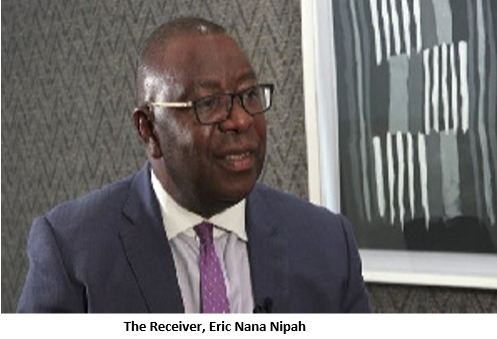
The receiver is set to pay GH₵151.8 million to 5,637 former staff of 209 defunct Specialised Deposit Taking Institutions (SDIs) as outstanding salary arrears and compensation due them before the end of this month. This follows the Bank of Ghana (BoG) making available funds to the receiver and official liquidator to fully settle employee-related claims which otherwise rank as unsecured claims in the receiverships/liquidation of the affected companies. GH₵144.3m compensation, GH₵7.5m salary arrearsThe amount is made up of GH₵144.3 million in compensation due the former employees and GH₵ 7.5million in salary arrears. GH₵24.6m for 2,036 staff of 177 Microfinance CompaniesA total of 2,036 staff of 177 Microfinance Companies (MFCs) will receive GH₵24.6 million for outstanding salary arrears and other related claims. GH₵20.3m compensation, GH₵4.3m salary arrears It comprises GH₵20.3 million compensation and GH₵4.3 million salary arrears. GH₵125.8m for 3,547 ex-staff of 21 Savings & Loans companies In addition, 3,547 former employees of 21 Savings & Loans (S&Ls) and Finance House Companies will also be paid GH₵125.8 million. GH₵122.7m compensation, GH₵3.1m salary arrears It is made up of GH₵122.7 million compensation and GH₵3.1 million salary arrears. GH₵1.4m for 54 ex-staff of 11 Microcredit CompaniesFor 11 microcredit companies (MCCs), 54 ex-staff will also receive GH₵1.4 million for outstanding salaries and compensations. GH₵1.35m compensation, GH₵0.05m salary arrearsThe compensation is GH₵1.35 million while the salary arrears is GH₵0.05 million.Full payment of all outstanding salaries post-receivership The Receiver, Mr Eric Nana Nipah, told journalists in Accra that the negotiated settlement includes full payment of all outstanding salaries post-receivership. Details of the compensation packageHe said the compensation includes three-month basic salary per each year of service, accrued outstanding leave days for 2019 to be commuted to cash, and option of first right of refusal to purchase official cars assigned to staff prior to receivership. He added that the rest are medical insurance for 2019 allowed to run till expiry; validation and payment of outstanding medical bills as at receivership date; and 30% discount on all outstanding loans. Challenges of poor records keepingOn challenges, he cited availability and access to employee data for verification and computation of exit packages as one of them. No employee records of 155 microfinance companies According to him, 155 MFCs had ceased operations prior to the receivership date and there are currently no employee records available for these MFCs. Negotiations with employees of 15 microfinance companies ongoingMr Nipah explained that negotiations and computations were currently ongoing with employees of 15 MFCs. 2 Savings and loans companies folded up prior to receivershipHe noted that two savings and loans companies had ceased operations and closed prior to receivership. 28 Microcredit companies folded up prior to receivershipHe also stated that there were no employee records for 28 microcredit companies that had ceased operations prior to revocation date. Receiver initially retained all staff willing to workThe receiver said he inherited all staff willing to work with them for an initial period of five months for MFCs and three-and-half months for S&Ls. Receiver inherited GH₵13.1 monthly payrollThe monthly payroll inherited by the receiver was approximately GH₵13.1 million for the over 5,000 staff retained. Receiver reduced monthly payroll to approximately GH₵5 millionMr Nipah said following a gradual phasing out process, the current staff strength of the receiver is approximately 2,000 with a monthly payroll of approximately GH₵5 million. The resolved companies are 347 microfinance companies, 23 savings & loans and finance house companies, and 39 microcredit companies in official liquidation.
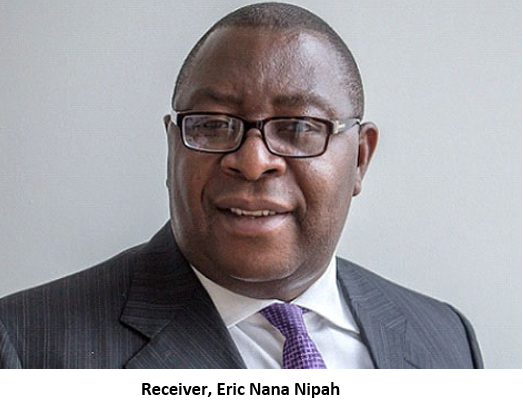
The Receiver for the defunct 347 Microfinance Companies and 23 Savings and Loans Companies and Finance Houses, Eric Nana Nipah, says the government is not only interested in recovering assets and paying depositors, but will also commence prosecutions from August this year. In an interview with Citi Business News, Mr. Nipah, who has assured a hundred percent payment of depositor claims by end of July, says about 96 percent of all validated depositor claims which stands at 5.4 billion Cedis have been settled. He says with the help of the Economic and Organized Crime Office, EOCO, assets worth about GHC 500 million Cedis have been recovered, adding that the work towards the prosecution from August has been carried out in the last one year. “We will also insist on rendering of stewardship not only to demand accountability but to ensure that due course is given to some situations. We have not relented and that is where EOCO comes in. We have been working with EOCO on potential recoveries and prosecutions for close to a year now. EOCO has done extensive work on investigations and we are at the point that as I speak, dockets are being prepared to be passed on to the AG’s department for prosecution beginning August this year” he said. The financial sector clean-up, which commenced under the Akufo-Addo administration in August 2017, led to the collapse of nine universal banks, 347 microfinance companies on May 31, 2019. The Bank of Ghana later in August 2019 again revoked the licenses of twenty-three (23) insolvent savings and loans companies and finance houses, whiles the Securities and Exchange Commission revoked the licenses of over 50 Fund Management Companies. According to the bank, this was in pursuant to Section 123 (1) of the Banks and Specialised Deposit-Taking Institutions Act, 2016 (Act 930), which requires the Bank of Ghana to revoke the license of a Bank or Specialised Deposit-Taking Institution (SDI) where the Bank of Ghana determines that the institution is insolvent.” EOCO freezes assets of defunct Ideal Finance boss, Nii Kotei Dzani Earlier this year, the Economic and Organized Crime Office (EOCO), froze some 31 accounts and some landed property of Nii Kotei Dzani, as part of efforts to among other things retrieve funds from him to settle customers whose funds are locked up with the defunct company. Ideal Finance was among the 23 savings and loans and finance houses that lost their licenses after they were declared insolvent by the Bank of Ghana as part of the financial sector clean-up.
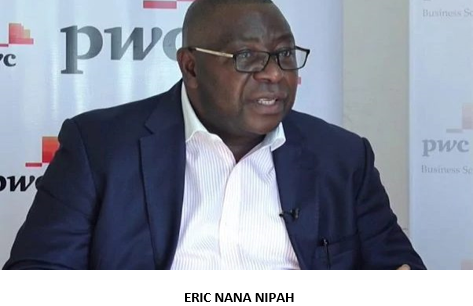
The Receiver of the defunct 347 Micro Finance Companies, 23 Savings and Loans and Finance Houses, Eric Nana Nipah, says customers who have not received their claims, should be able to access them by the end of July this year. According to Mr. Nipah, he has already paid about 96% of customers, and is hopeful of completing the remainder by the end of July 2020. Speaking on the Citi Breakfast Show, Mr. Nipah also said he has been able to save the country 1 billion cedis by scrutinizing fictitious claims. “For depositors, we have come a very long way and I have been able to determine that actually, the depositor base in the three Receiverships is in the region of GHS 5.4 billion by value of valid depositor claims that I have received. And out of that, I have been able to pay close to 96% of these claims,” he said. He also noted that about 98% of all the depositor claims will be paid in cash, while the remaining 2% will be paid through a combination of cash and bonds. “I am on course to fully pay 98% of all depositor claims by way of cash. The two per cent that remains is being paid through a combination of cash and commercial paper which we commonly refer to as bonds”. He further noted that, “through the very effective and robust validation mechanism that I have put in place, I have also been able to save the nation close to a billion cedis by way of robust and resilient validation processes,” he added. Meanwhile, former employees of the defunct companies are also to receive their outstanding claims before the end of July 2020. This follows the completion of negotiations between the Receiver and Representatives of the workers. “The money should start hitting their accounts within July; before the end of July 2020. So let me give that assurance that the month of July, there will be a commencement of payment of employee related claims”. This comes after the Bank of Ghana agreed to pre-finance the full outstanding salaries and negotiated an exit packages of the former employees. The Bank of Ghana, between 2017 and 2019, revoked the licenses of nine local commercial banks and over four hundred financial institutions comprising Micro-finance, Savings and Loans as well Finance Houses, for violating various regulations guiding their operations. This affected about 4.6 million depositors whose monies could have been lost completely had the regulators not taken the action. It all began in August 2017, when the Bank of Ghana (BoG) gave GCB Bank Ltd the green light to acquire two local banks UT and Capital bank due to severe impairment of their capital. Later in August 2018, the Bank of Ghana consolidated five other local banks into the Consolidated Bank Ghana Limited. Then in May, 2019, 347 Microfinance Companies also had their licenses revoked by the Bank of Ghana. The Bank of Ghana later in August 2019 again revoked the licenses of twenty-three (23) insolvent Savings and Loans Companies and Finance Houses, whiles the Securities and Exchange Commission revoked the licenses of over 50 Fund Management Companies.
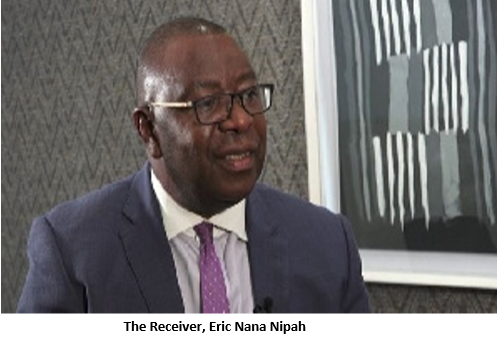
IN THE MATTER OF THE BANKS AND SPECIALISED DEPOSIT-TAKING INSTITUTIONS ACT, 2016 (ACT 930) IN THE MATTER OF THE RECEIVERSHIPS OF THE RESOLVED 347 MICROFINANCE COMPANIES AND THE 23 SAVINGS AND LOANS AND FINANCE HOUSE COMPANIES NOTICE OF FULL PAYMENT OF OUTSTANDING SALARIES AND NEGOTIATED AND AGREED EXIT PACKAGES TO EX-STAFF OF THE RESOLVED MICROFINANCE AND SAVINGS & LOANS AND FINANCE HOUSE COMPANIES In accordance with Section 123 of Act 930 Bank of Ghana (BoG) appointed Eric Nana Nipah, a Director of PricewaterhouseCoopers (Ghana) Limited (PwC) as Receiver for the purposes of winding down the affairs of 347 Micro Finance Companies (“MFCs”) as well as 23 Savings and Loans and Finance House Companies (“S&Ls”) whose licenses were revoked on 31 May 2019 and 16 August 2019 respectively. The main duties of the Receiver are; To recover and maximise asset realisations for the benefit of Creditors, including employee claims; and Distribute realisations in accordance with the relevant provisions of Act 930, to satisfy the indebtedness of these institutions to their body of Creditors, to the extent possible. As you may be aware, the Asset Realisations phase, a key component of the receiverships is currently underway albeit at a relatively slow pace due mainly to the following reasons: Poor quality of assets of some of these institutions Asset diversion Misstatement of a significant number of assets of some of these companies in the financial records of these resolved companies, Accordingly, the Receiver is compelled to undertake a detailed assets tracing and forensics exercise in collaboration with the Economic and Organised Crime Organisation (“EOCO”) to locate and recover these assets. The consequence in pursuing this recovery route is that creditor claims including employee related claims in the resolution of the affected MFCs and S&Ls are not likely to be settled any time soon. To ameliorate the economic impact of the resolution exercise on former employees of these affected companies particularly in these times of COVID, Bank of Ghana has agreed to pre-finance the full settlement of employee related claims which otherwise rank as Unsecured claims in the receiverships of these companies. The Receiver will in the week commencing Monday, 13 July 2020 engage with the authorised representatives of the ex-staff to agree on modalities for the payment of outstanding salaries and exit packages to ex-staff of these resolved institutions. In line with the hierarchy of creditor claims set out under Act 930, other creditors of the failed institutions will be settled by the Receiver upon validation of their claims and to the extent that the Receiver is able to realise value from the remaining assets of these institutions. Please note that the Receiver will only fully settle outstanding salaries and exit packages of ex-staff which have been duly validated agreed and in the resolution process. Stakeholders may direct all concerns on the above receiverships to the Receiver, Eric Nana Nipah, at No 25 B Manet Tower B, Airport City, Accra, or on telephone +233 (0) 242 439 441, or visit www.ghreceiverships.com for more information. SGD ERIC NANA NIPAH
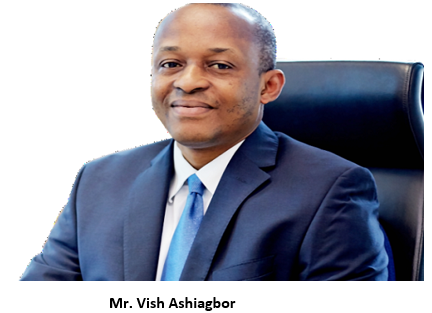
One of the receivers of the defunct Capital Bank, Mr Vish Ashiagbor, yesterday took the witness box to testify as a prosecution witness in the trial of the Founder of the bank, William Ato Essien, and three others who have been accused of collapsing the bank. Mr. Ashiagbor and Mr. Eric Nana Nipah, both Directors of PricewaterhouseCoopers (PwC) Ghana Limited, were appointed by the Bank of Ghana (BoG) in 2017 as the joint receivers of Capital Bank after the central bank determined that Capital Bank was insolvent and subsequently revoked its operating license. Essien, the Managing Director of the bank, Fitzgerald Odonkor, and two other persons — Tettey Nettey, the Managing Director of MC Management Services, a company said to be owned by Essien, and Kate Quartey-Papafio, a businesswoman, are on trial on 26 counts. They have pleaded not guilty to various counts of stealing, abetment to stealing, conspiracy to steal and money laundering. Alleged suspicious transactions In his testimony before the Accra High Court, Mr. Ashiagbor testified that an investigation by the receivers into the affairs of Capital Bank revealed suspicious transactions at the bank, especially with regard to a GH¢620 million liquidity support given to the bank by the BoG between June 2015 and November 2016. For example, he said, Essien took GH¢27.5 million of the liquidity supports and used it as payment for business promotions. Also, he testified that GH¢130 million of the liquidity support was given to a company known as All Time Capital to be used for the purchase of commercial papers, but the amount ended up being used to set up another bank, known as Sovereign Bank. The witness further said GH¢70 million of the liquidity support, which was part of a financing arrangement supposedly meant to discount the invoices of three companies who had executed work for the Department of Urban Roads (DUR), was transferred to the account of the fourth accused person, Quartey-Papafio, a businesswoman. The businesswoman, he said, transferred the amount back to Capital Bank to be used for the purchase of shares of the bank. “Our investigations revealed that the transaction was part of a financial reengineering scheme adopted by Capital Bank to give the appearance of raising new capital,” Mr. Ashiagbor testified. Conflict of interest During cross-examination, counsel for Essien, Mr. Thaddeus Sory, attacked the report which detailed the alleged suspicious transactions at Capital Bank on the procedure used to prepare it, as well as its content. In terms of procedure, counsel sought to make a case that the report was not done in conformity with the Banks and Specialised Deposit -Taking Institutions Act, 2016 (Act 930), and also it revealed a clear case of conflict of interest. Mr. Sory, through his line of questioning, put to the witness that the report was done by PwC, but per Act 930, it was not the PwC that was appointed as the receiver of Capital Bank but rather Mr. Ashiagbor and Mr. Nipah. Mr. Ashiagbor agreed with counsel on the point that per Act 930, a receiver must be an individual and not a corporate entity. He, however, added Act 930 permitted a receiver to engage the services of other professionals and institutions in the discharge of his duties. “We, as joint receivers, used the services of PwC to prepare the report,” he said. Mr. Sory then said such a move would amount to a conflict of interest because the joint receivers were also directors of PwC. The witness disagreed and explained that the BoG recognized the fact that the joint receivers were directors of PwC before they were appointed as receivers. “I believe the reason for that acknowledgement is that the BoG expected us to use the professional expertise that exists at PwC to discharge our responsibility,” he said. Not suspicious transaction Delving into the report itself, Mr. Sory tried to prove that the transactions Mr. Ashiagbor had described as suspicious were actually genuine transactions. For instance, with regard to the GH¢70 million which resulted from the discounting of invoices for three companies, counsel asked the witness if the DUR had issued payment certificates to the three companies, to which the witness answered in the affirmative. Mr. Sory then asked the witness if his investigations showed that Capital Bank had written to the DUR to confirm those payment certificates, to which Mr. Ashiagbor again answered in the affirmative. Counsel then made a case that Capital Bank had valid payment certificates from the three companies before it discounted the invoices and, therefore, the bank conducted due diligence in that particular transaction. Mr. Ashiagbor answered that during investigations, the receivers did not find the said payment certificates. “That was one of the reasons we found these transactions to be suspicious,” he said. The cross-examination will continue on July 16, this year at the court, presided over by Justice Eric Kyei Baffour, a Justice of the Court of Appeal with additional responsibility as a High Court judge. Background Capital Bank was one of the first banks that collapsed after a massive clean-up of financial institutions by the BoG started in 2017. On August 14, 2017, its license and that of UT Bank were revoked by the BoG, after the BoG had declared them insolvent. The BoG allowed the state-owned bank, the GCB Bank, to acquire the two banks in order to protect depositors’ funds and also enable them to stay afloat. The hurricane that swept through the banking sector due to the collapse of the two banks further heightened in August 2018 when the central bank collapsed five other indigenous banks and merged them into one entity — Consolidated Bank, Ghana.
IN THE MATTER OF THE BANKS AND SPECIALISED DEPOSIT-TAKING INSTITUTIONS ACT, 2016 (ACT 930) IN THE MATTER OF THE RECEIVERSHIPS OF THE 347 MICROFINANCE COMPANIES AND THE 23 SAVINGS & LOANS AND FINANCE HOUSE COMPANIES NOTICE TO THE GENERAL PUBLIC SALE OF LANDED PROPERTIES, CHATTELS AND USED VEHICLES OF THE 347 MICROFINANCE COMPANIES AND 23 SAVINGS & LOANS AND FINANCE HOUSE COMPANIES (ALL IN RECEIVERSHIP) As you may be aware, pursuant to Section 123 (1) of the Banks and Specialised Deposit-Taking Institutions Act, 2016 (Act 930), Bank of Ghana (“BoG”) on 31 May 2019 and 16 August 2019 revoked the operating licenses of 347 insolvent Microfinance Companies and 23 Savings and Loans and Finance House Companies respectively. BoG in accordance with Section 123(2) of the Banks and Specialised Deposit-Taking Institutions Act, 2016 (Act 930) appointed Eric Nana Nipah, a Director of PricewaterhouseCoopers Ghana Limited (“PwC”), as the Receiver for the purposes of winding down the affairs of these institutions. A key component of the Receiver’s mandate is to secure all assets of the resolved companies and maximise their realisations for the benefit of creditors. Accordingly, the Receiver wishes to inform the general public that he is requesting for firm bids from potential buyers to acquire some Landed Properties and Motor Vehicles of the resolved companies for his evaluation. Due to the current Corona Virus (Covid-19) Pandemic, all interested bidders are required to visit the Receiver’s website to view pictures of the available for sale Landed Properties and Motor Vehicles using the following link www.ghreceiverships.com. Please note that the pictures are grouped according to the current location of the Landed Properties or Motor Vehicles, i.e. Kumasi, Takoradi and Accra. All interested bidders should submit their bids in a signed and dated formal letter, scanned and attached in an email addressed to the following email address, clearly indicating the item(s) of asset(s) they are interested in and the bid amount for each asset: vehicletender.receivership@gmail.com Please note that all bids which fall short of the above requirement will be rejected. All bids are to be submitted on or before Friday, 31 July 2020. Conditions and Payment Modalities: Highest bidder shall be the purchaser Winners will be notified and will have 48 hours to make payment or lose the opportunity. “As is where is” For further information please contact the Receiver’s duly authorised representatives: Nicholas Anum on 0243390044 and Wilfred Tackie on 0249889540. SGD ERIC NANA NIPAH
